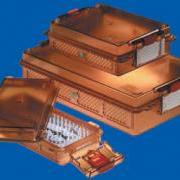Sabic developed a custom resin designed to maintain performance and quality during repeated cleanings
September 14, 2010
|
A custom-developed polyetherimide resin enabled the Polysteribox to comply with new recommended requirements regarding the cleanliness of reusable medical products. |
Designed to withstand autoclave, plasma, and gas sterilization methods, the Polysteribox is a reusable sterilization and transport container optimized for the procurement, storage, and logistics of sterile products. In addition to boasting twice the ventilation time as that of a metal container, the product also features a built-in bacteria barrier that prevents contamination without additional gaskets, according to its manufacturer, Ritter GmbH (Schwabmünchen, Germany).
When it was introduced to the market, the Polysteribox was the first product of its kind and garnered an award in 1993 for its inventor from the German Environmental Management Association. However, a growing emphasis on patient and clinician safety--such as avoiding hospital-acquired infections--in recent years has prompted stricter requirements for cleanliness of reusable medical devices and equipment recommended by such organizations as the Robert Koch Institute.
To accommodate these changes, Ritter called on engineering thermoplastic specialist Sabic Innovative Plastics (Pittsfield, MA) to assist with achieving compliance. "We were using a different grade of Ultem resin for the Polysteribox container when we learned about the new chemical cleaning and autoclave requirements," recalls Michael Fuchs, Ritter medical products manager. "Sabic immediately began development work to create a new grade meeting our specifications, which included high stiffness, ductility and compressive strength, transparency to see inside without opening the container, and colorability."
The new Ultem polyetherimide healthcare resin grade enables the Polysteribox to maintain its performance and quality during repeated cleanings using harsh, alkaline chemicals. It also meets ISO 10993 certification criteria for biocompatibility and maintains its high performance and transparent appearance after 1000 cycles of chemical cleaning at a PH of 12 or 13 and 1000 cycles of autoclaving at temperatures of up to 148ºC.
By upgrading to the new Ultem resin material, Ritter was also able to raise the autoclave vacuum sterilization temperature of its Polysteribox container to 134ºC. Not only does this higher temperature appear to destroy such pathogens as bovine spongiform encephalopathy, but it also shortens the total autoclave cycle time to 20 minutes, versus 30 minutes at the previous temperature of 121ºC. Shorter autoclaving cycles can help healthcare organizations improve productivity and reduce costs. In both cases, the material retains ductility, transparency, and mechanical properties over a long lifespan, according to Sabic.
"Today's healthcare industry is incredibly dynamic, requiring the latest material solutions to meet new safety, quality, and cost demands from regulators, clinicians, and the public," says Rob de Jong, Sabic specialty product manager. "Our work with Ritter on the new Ultem healthcare resin showcases our ability to create specialized grades under tight timeframes. We're delighted that this new, ultra-high-performance material is helping a valued customer offer an improved product to the marketplace."
You May Also Like



